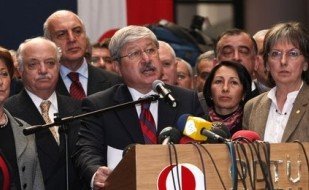MPs of the ruling Justice and Development Party (AKP) and the opposition National Movement Party (MHP), the parties which collaborated on a bill proposing constitutional amendment, have found themselves debating what kind of headscarf would be acceptable.
"As our mothers and grandmothers wore it"
The bill also proposes a change in Higher Education Council (YÖK) law; Article 17, which deals with attire, will be amended with the following sentences:
“No one can be deprived of higher education because they cover their heads and there can be no implementations in that direction. However, the style of covering must leave the face of the person open in order to allow identification and must be tied under the chin.”
This style of tying a headscarf is popular described as "as our mothers and grandmothers wore/wear it.” In Turkish, a distinction is made between the “head covering” (bas örtü) thus tied, and the “türban”, which is wrapped tightly around the head and the throat and tied at back. The türban is popular among young women and is the headscarf type which is typically condemned as a religious symbol by laicists.
Prof. Ergun Özbudun, the academic heading the board of experts which prepared a new constitutional draft before this bill was proposed, has found the specification of a headscarf tied under the skin “ridiculous.” He said, “So are we now going to take fashion experts to the university gates to demonstrate the legal style?”
Prime Minister Recep Tayyip Erdogan has told MPs not to discuss the headscarf, making an exception for the four MPs involved in organising meetings on the issue.
Deputy Prime Minister Cemil Cicek, one of those allowed to speak on the issue, said in answer to questions by the Hürriyet newspaper:
“Girls wearing the ‘türban’ will not be able to enter university. They can only go if they tie the headscarf under the chin. When we were discussing the issue, we thought of defining the way of tying as the ‘traditional Anatolian headscarf;” however, then we thought that some people may argue that some people in Anatolia may think this includes the black chador, so we gave up that definition. We even discussed whether we should add a photo to the law, showing how the headscarf should be tied.”
Baykal: "Has there been a reinterpretation of Islam?"
Deniz Baykal, chair of the Republican People’s Party (CHP) which sees itself as a defender of laicism in the country, has reacted strongly to the issue:
“What is this ‘türban’? Was there a ‘türban’ fifty years ago? Were people not Muslims 50 years ago? So, if the türban is being shown as an indispensable part of Islam, did Muslims 40-50 years ago not know this? Has Islam been reinterpreted? Has there been a new prophet?”
Bahceli: Change limited to higher education
Devlet Bahceli, chair of the MHP, the party which has collaborated on the bill, said:
“The headscarf ban is being lifted in a limited manner, only in higher education. The changes that will be made will only affect institutions of higher education. Primary and middle schools and employers in the public sector will be excluded.”
Independent MP Mesut Yilmaz said, “If we do not offer a solution to this issue with a general compromise, the tension we experience today will turn into conflict. A separation into camps brings conflict.” (GG/TK/AG)
* This article used information from the Hürriyet and Milliyet newspapers and NTV channel.












